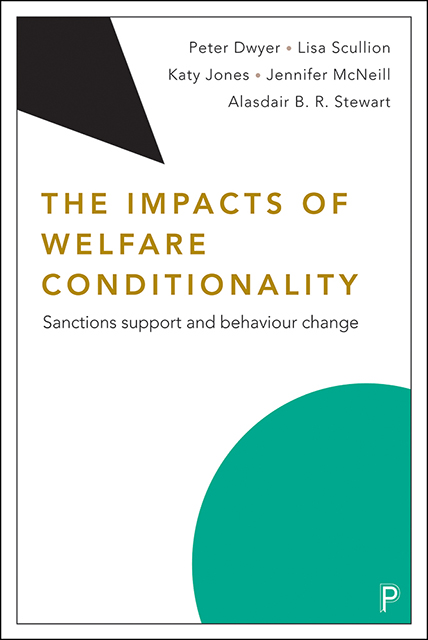Book contents
- Frontmatter
- Contents
- List of figures and tables
- List of abbreviations
- About the authors
- Acknowledgements
- One Introduction
- Two Conditionality in the UK welfare state
- Three Welfare conditionality and behaviour change
- Four From welfare to work? The effectiveness of welfare conditionality in moving people into paid employment
- Five Welfare conditionality and problematic or antisocial behaviour
- Six Unintended outcomes? The wider impacts of compulsion and benefit sanctions in social security
- Seven Ethical debates
- Eight Conclusions
- Methods appendix
- References
- Index
Seven - Ethical debates
Published online by Cambridge University Press: 17 June 2023
- Frontmatter
- Contents
- List of figures and tables
- List of abbreviations
- About the authors
- Acknowledgements
- One Introduction
- Two Conditionality in the UK welfare state
- Three Welfare conditionality and behaviour change
- Four From welfare to work? The effectiveness of welfare conditionality in moving people into paid employment
- Five Welfare conditionality and problematic or antisocial behaviour
- Six Unintended outcomes? The wider impacts of compulsion and benefit sanctions in social security
- Seven Ethical debates
- Eight Conclusions
- Methods appendix
- References
- Index
Summary
Beyond previously discussed efficacy issues, welfare conditionality also raises significant ethical questions about the fairness of its use. These debates are important for two reasons. First, because welfare conditionality, by directly linking prescribed patterns of individual behaviour to the regulation of citizens’ access to collectivised systems of welfare, raises profound questions about the substance and reach of welfare states. Second, because governments’ use of welfare conditionality as a behaviour change tool raises deep-seated disagreements about if, when, and why governments might be justified in seeking to modify citizens’ behaviour. The first part of this chapter reviews the main arguments made by proponents and opponents of welfare conditionality. It does this through a discussion of four key contested normative, ethical positions that inform the thinking of advocates and adversaries of welfare conditionality. These are contractualism, paternalism, mutualism and ‘unconditional’ entitlement; the latter based on either universal human rights or the more bounded universalism of national citizenship. Each of these four approaches offer differing ethical stances on the legitimacy of using behavioural mechanisms to alter and regulate citizens’ conduct and the fairness of denying, or rescinding, access to collectivised welfare provisions for non-compliant individuals. These essentially theoretical discussions then facilitate empirically grounded analysis of welfare service users’ (WSUs) diverse opinions on the rights and wrongs of welfare conditionality. The second part of the chapter explores WSUs’ views on the fairness of a principle of welfare conditionality, that broadly asserts that access to collective welfare goods and services should be made contingent on citizens accepting state-specified, individual responsibilities. Questions about the appropriateness of UK governments extending welfare conditionality to previously exempt groups (that is, lone parents and disabled people specifically) are then considered in the third section.
Advocates and adversaries: ethical aspects of welfare conditionality
Behaviour change usually becomes a focus for policymakers’ interventions when the conduct of a specific group is identified as morally reprehensible and/ or a particularly significant drain on state resources (Chatterton, 2016). These themes resonate strongly among proponents of welfare conditionality who view it as a legitimate approach for changing the behaviour of ‘irresponsible’ citizens who are dependent on social security benefits and welfare services.
- Type
- Chapter
- Information
- The Impacts of Welfare ConditionalitySanctions Support and Behaviour Change, pp. 137 - 154Publisher: Bristol University PressPrint publication year: 2022

